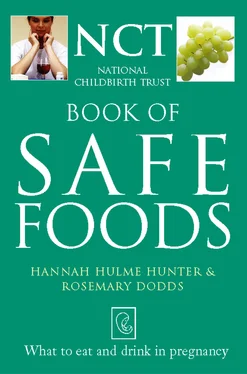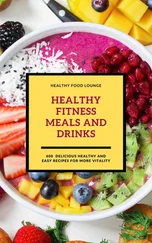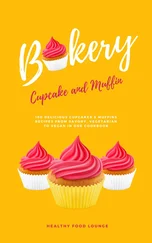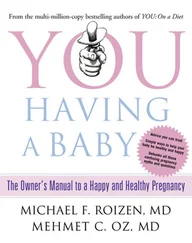Signs of a urine infection may include pain when passing urine, needing to go to the toilet often, or needing to go very urgently. Your urine may be dark in colour, cloudy or smelly. If you are worried that you may have a urine infection, start drinking plenty of water to wash out the germs, and contact your family doctor or midwife.
In this chapter we have described a basic plan for balanced eating: plenty of starchy carbohydrates, lots and lots of fruit and vegetables, small amounts of protein and milk foods, tiny quantities of fatty and sugary food – and plenty of water and other fluids. Enjoy your food!
 A balanced meal contains plenty of starchy carbohydrates, lots of vegetables and fruit, small amounts of protein and dairy produce, and tiny quantities of fatty and sugary foods.
A balanced meal contains plenty of starchy carbohydrates, lots of vegetables and fruit, small amounts of protein and dairy produce, and tiny quantities of fatty and sugary foods.
 Try to eat five servings of fruit and vegetables each day (fresh, tinned, frozen or dried). Remember that over-cooking will reduce the vitamin content of these foods.
Try to eat five servings of fruit and vegetables each day (fresh, tinned, frozen or dried). Remember that over-cooking will reduce the vitamin content of these foods.
Aim for two servings of animal protein, or two to three servings of vegetable protein, each day.
 Try to have three servings of milk, or milk-based foods (cheese, yoghurt, and so on) each day.
Try to have three servings of milk, or milk-based foods (cheese, yoghurt, and so on) each day.
Choose foods low in fat and sugar to allow for the occasional treat of sweets or crisps. Remember that unsaturated fats are healthier than saturated fats.
Water is important! Try to drink 6–8 glasses of water, or other fluid, each day. (This does not include milk or alcohol!)
2 More about healthy eating
In this chapter, we talk in more detail about some of the vitamins, minerals and other nutrients mentioned in Chapter 1.
Eating the kind of balanced diet described in Chapter 1will ensure that you take in plenty of most vitamins and minerals without worrying about any extra foods or supplements. There are a few exceptions to this – the most significant one being folic acid, one of the B group of vitamins. This is a very important vitamin for pregnant women – and for women planning a pregnancy.
There are a few other vitamins and minerals that certain groups of women may need to take special note of: for example, vitamin B 12if you eat a vegan diet, iron if you had very heavy periods before pregnancy, and vitamin D if you rarely go out of doors. Read on to find out more.
Folic acid: a very important vitamin for babies
Important: if you suffer from epilepsy, it is important to see your doctor before taking a folic acid supplement. Better still talk to him or her before you become pregnant.
Our bodies need folic acid (sometimes called folate) to make DNA. DNA carries the genetic information that controls the correct development and function of every single cell in our bodies. When you are pregnant, you need extra folic acid – especially in the first 12 weeks while your baby’s body is being formed.
Insufficient folic acid at this time can contribute to problems with the neural tube of your developing baby. The neural tube develops in the very early weeks of pregnancy. It eventually forms your baby’s brain and spinal cord (the long bundle of nerves inside our backbones that connects our brains with the rest of our bodies). You may have seen, or heard, the abbreviation NTD – this stands for neural tube defect. The most common type of neural tube defect is spina bifida. If you decide to have an ultrasound scan during your pregnancy, your baby’s spine will be checked for signs of spina bifida.
Although NTDs are rare, the UK government advises all pregnant women to take folic acid supplements and eat more foods rich in folic acid. Extra folic acid is particularly important for women who have already had a baby with a neural tube problem.
Folic acid supplements are available on prescription from your GP or midwife. NHS prescriptions are free to pregnant women. If you are not pregnant, you may have to pay for your prescription. In this case, it is cheaper to buy a folic acid supplement from a chemist or supermarket. Ask the pharmacist for advice.
Most folic acid supplements are small, white tablets. The recommended dose is 0.4mg each day. (This is sometimes written as 400μg, 400mcg or 400 microgrammes.) Much higher doses are given to women who have already had a baby with an NTD – ask your GP for guidance.
As well as taking a folic acid supplement, increase the amount of folic acid in your diet. This is good advice for all women – pregnant or not! Remember that folic acid, like most vitamins, is easily destroyed by cooking. It is therefore best to steam, microwave or stir-fry vegetables rich in folic acid – or cook in the minimum of water. Don’t overcook!
The government also advises that women planning to become pregnant should take folic acid supplements. This is because the neural tube develops during the first four weeks of pregnancy – when a woman may not realise she is pregnant. However, because many pregnancies are unplanned, this is not always possible. If you find yourself in this position, start taking a folic acid supplement as soon as possible, and increase the amount of folic acid in your diet. Remember that NTDs are relatively uncommon.
Foods rich in folic acid (best first)
 green leafy vegetables – brussels sprouts, spinach and broccoli
green leafy vegetables – brussels sprouts, spinach and broccoli
other vegetables – green beans, potatoes, cauliflower, peas and cabbage
 tinned baked beans
tinned baked beans
citrus fruits – oranges, orange juice and grapefruit
fortified breakfast cereals (fortified means that extra nutrients have been added to the food – check the nutritional information chart on the packet)
bread – especially fortified bread (check the label) and wholemeal bread
 yeast extract and beef extract
yeast extract and beef extract
 milk
milk
Vitamin B 12: another B group vitamin
There are many B group vitamins. Eating a balanced diet will give us plenty of all of them – except perhaps for folic acid and vitamin B 12.
Vitamin B 12(or ‘cobalamin’) is needed, like folic acid, for the production of new cells – especially new red blood cells. It also contributes to a healthy nervous system and is involved in the making of fatty acids. Vitamin B 12is therefore particularly important during pregnancy.
Vitamin B 12is found naturally only in foods that come from animals – meat, fish, eggs, milk and so on. It is also added to some breakfast cereals during their manufacture. It is very rare for women who eat animal foods to be deficient in vitamin B 12.
Women who do not eat meat will probably still get enough vitamin B 12from other animal foods, but women who do not eat any animal produce at all (a vegan diet) can become short of vitamin B 12. If you follow a vegan (or near vegan) diet, it is a good idea to eat plenty of fortified foods, and consider a B 12supplement. Ask your family doctor or a pharmacist to recommend a suitable supplement.
Читать дальше

 A balanced meal contains plenty of starchy carbohydrates, lots of vegetables and fruit, small amounts of protein and dairy produce, and tiny quantities of fatty and sugary foods.
A balanced meal contains plenty of starchy carbohydrates, lots of vegetables and fruit, small amounts of protein and dairy produce, and tiny quantities of fatty and sugary foods.










